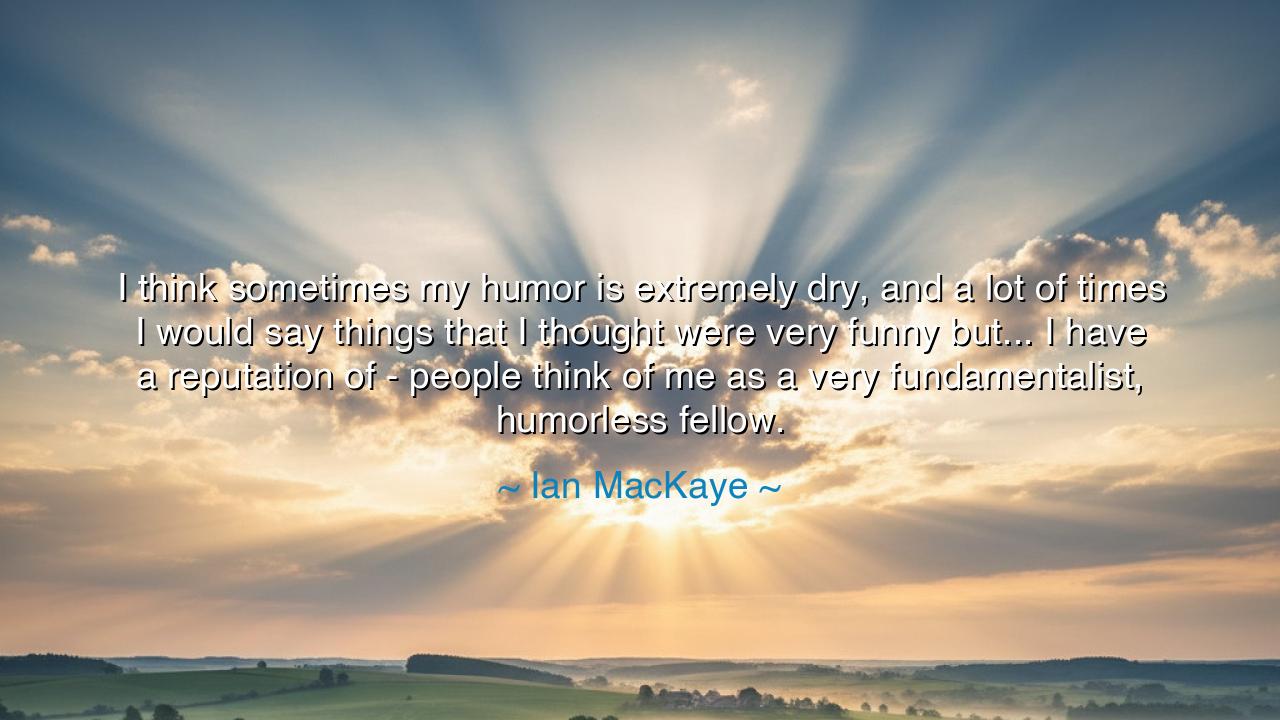
I think sometimes my humor is extremely dry, and a lot of times I
I think sometimes my humor is extremely dry, and a lot of times I would say things that I thought were very funny but... I have a reputation of - people think of me as a very fundamentalist, humorless fellow.






The musician and thinker Ian MacKaye, founder of the punk bands Minor Threat and Fugazi, once said: “I think sometimes my humor is extremely dry, and a lot of times I would say things that I thought were very funny but... I have a reputation of — people think of me as a very fundamentalist, humorless fellow.” These words, though simple in form, reveal a timeless tension that every truth-seeker, artist, or reformer must face — the misunderstanding between intensity and warmth, between conviction and humor, between the image one projects and the heart one holds within. In this confession lies not complaint, but insight: that those who speak with passion are often mistaken for zealots, and that the fire of sincerity can sometimes obscure the quiet flicker of laughter beneath.
When MacKaye calls his humor “extremely dry,” he speaks of that subtle wit which does not shout for recognition but waits for those who listen closely. Dry humor is the laughter of intellect and irony — it hides behind seriousness, revealing itself only to those who share its rhythm. Yet MacKaye’s words go deeper than style. They remind us that those who dedicate themselves to principle often walk a lonely path. The world, accustomed to compromise, grows uneasy around those who live by conviction. To stand firmly for one’s beliefs — as MacKaye did in the Straight Edge movement, rejecting excess and false rebellion — is to risk being seen as rigid, even joyless. But beneath such firmness often lies not sternness, but clarity, and beneath that clarity, a heart that still knows how to smile, even if the world forgets to see it.
The ancients knew well this paradox. Socrates, the father of philosophy, was also known for his humor. Yet his enemies called him dangerous, subversive, humorless — a corrupter of youth. They saw only the sharpness of his questioning, not the mischief of his smile. And when he stood before the court that condemned him, he joked gently with his accusers, saying that if they waited, his death would come soon enough by nature’s hand. His laughter, dry and defiant, was misunderstood as arrogance. But it was, in truth, the laughter of wisdom — the calm mirth of one who has seen life’s illusions clearly. In the same way, MacKaye’s words carry the echo of this ancient wisdom: that humor and integrity are not opposites, but siblings — misunderstood only by those who see with fear instead of depth.
MacKaye’s reflection also teaches us something profound about the price of authenticity. When one refuses to conform — to the world’s fashions, its hypocrisies, its hollow laughter — the world grows suspicious. It assumes that one who does not join in its shallow jokes must be without joy. Yet the truest joy is not loud or showy. It is quiet, reflective, rooted in purpose. The laughter of the wise is not the laughter of mockery, but of perspective — the recognition that even in struggle, there is absurdity, and even in discipline, there is grace. His “humorless” image, then, becomes a mirror for society’s own blindness — for often, it is not the one who laughs too little who has lost his soul, but the one who laughs too easily.
Consider also the story of Marcus Aurelius, the philosopher-emperor of Rome. In his Meditations, he spoke often of duty, of restraint, of discipline — words that to many seem stern. Yet in his private writings, there is a subtle smile, a gentleness toward human folly. He wrote that life is brief, and that we must learn to take the faults of others lightly, “as one does the barking of a dog.” There, hidden between lines of stoic rigor, lies humor — not the humor of jest, but of compassionate understanding. Like MacKaye, Marcus knew that seriousness does not exclude warmth. It is possible to stand firm and still laugh softly at the absurdity of existence.
The lesson in MacKaye’s words is one of balance. It reminds us that passion need not destroy humor, and that humor, when quiet and sincere, can coexist with the fiercest conviction. To live truly is to live wholly — to let laughter dwell beside discipline, gentleness beside strength. Those who misunderstand you will always be there, for the world often mistakes still water for depthless water. Do not let their perception define your spirit. Instead, continue to speak your truth with courage, and let your laughter — however dry, however subtle — be the secret flame that keeps your heart human.
And so, dear listener, remember this teaching: the wise often appear stern, but within them burns a laughter the world is too hurried to hear. Do not silence your joy for fear of being misunderstood, nor dull your convictions for the sake of being liked. Be as MacKaye — firm in principle, light in soul. Let your humor be quiet but enduring, the laughter of one who knows that sincerity and mirth are not rivals, but allies in the eternal art of being whole. For the truest humor, like the truest wisdom, comes not from jesting at the world, but from seeing it clearly — and smiling still.






AAdministratorAdministrator
Welcome, honored guests. Please leave a comment, we will respond soon